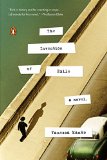Summary | Excerpt | Reading Guide | Reviews | Beyond the Book | Read-Alikes | Genres & Themes | Author Bio

A Novel
by Vanessa MankoIn a book club? Subscribe to our Book Club Newsletter!
Please be aware that this discussion guide will contain spoilers!
Recommended Reading
The Odyssey by Homer
As the original quest story about the longing for home, Odysseus' journey to return to Ithaca and to his beloved Penelope helped me to imagine
Austin's particular "odyssey" and his abiding love for Julia.
Doctor Zhivago by Boris Pasternak
This classic novel about the doomed love affair between Zhivago and Lara and its depiction of how lives are torn apart during the Russian Revolution and civil war served as inspiration as I wrote about Austin and Julia's hardships while in Russia at this time.
Crime and Punishment, Notes from
Underground, The Double by Fyodor
Dostoyevsky
Dostoyevsky is a master of portraying the complex, fraught psychology of the Russian soul and these novels were influential while I was developing Austin's mindset and character.
Selected Poems by Anna Akhmatova
Akhmatova, a member of the Russian intelligentsia, did not flee Russia with other artist émigrés but stayed on, living in St. Petersburg and writing poetry throughout the Russian civil war and Stalinism. Fiercely attached to Russia, she did not turn her back on her country, and her poems celebrate the history and culture of
pre-Revolutionary Russia while at the same time lamenting what the country had become and what she had lost. Though she wrote them in Russia, her poems are sad and filled with a deep sense of alienation, evoking the state of exile.
The Trial by Franz Kafka
Kafka's portrayal of absurd, deadening bureaucracy helped me to understand Austin's own struggles with government and his repeated, frustrated attempts to reenter the United States.
Where the Air Is Clear by Carlos Fuentes
This novel is composed of a series of vignettes about characters from different social and cultural classes within Mexico City, and with Ixca Cienfuegos as a kind of narrator-guide, it is also a portrait of the city itself and helped me to gain
a fuller understanding of what the city must have been like in the 1940s and '50s.
There is a long tradition of English and American writers who have written about Mexico and I wanted to understand how those before me did it. The following three novels were major influences:
Under the Volcano by Malcolm Lowry
The Power and the Glory by Graham Greene
Stones for Ibarra by Harriet Doerr
Unless otherwise stated, this discussion guide is reprinted with the permission of Penguin Books. Any page references refer to a USA edition of the book, usually the trade paperback version, and may vary in other editions.
Knowledge is of two kinds. We know a subject ourselves, or we know where we can find information on it.
Click Here to find out who said this, as well as discovering other famous literary quotes!
Your guide toexceptional books
BookBrowse seeks out and recommends the best in contemporary fiction and nonfiction—books that not only engage and entertain but also deepen our understanding of ourselves and the world around us.